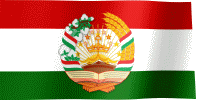The flag of Tajikistan (Tajik: Парчами Тоҷикистон / Parçami Tojikiston / پَرچَمِ تاجِیکِستان) is a vibrant embodiment of the nation's history, culture, and aspirations. The tricolor design consists of horizontal stripes of red, white, and green, each carrying significant symbolism. The red stripe signifies the unity of the nation and embodies themes of victory and resilience, harking back to historical struggles and sacrifices. White represents purity, morality, and the pristine snow-capped mountains that are integral to Tajikistan's landscape. Green symbolizes the bountiful nature of the land, the richness of the valleys, and the significance of Islam in the country. At the center, the golden crown with seven stars, influenced by Persian mythology, represents the prestigious Samanid dynasty and the proud heritage of the Tajik people and refers to the Persian word taj, meaning crown, from which the name of the Tajik people comes. The seven stars epitomize perfection and happiness, reflecting the cultural significance of the number in ancient Persian traditions. Collectively, the flag of Tajikistan captures the essence of the nation's cultural legacy, natural beauty, and the resilience of its people.
| Proportion: | 1:2 |
|---|---|
| Adopted: | November 24, 1992 |
| Designed by: | Zuhur Habibullaev |
| Flag image: | Animated GIF (25 frames looped) |
| Flag emoji code: | 🇹🇯 |
The emblem of Tajikistan is a vibrant depiction of the nation's natural beauty and cultural heritage. At its core, a rising sun behind the Pamir Mountains signifies hope, enlightenment, and the country's determination for progress. The open book on the lectern represents knowledge, education, Islamic education, and the pursuit of wisdom, reflecting Tajikistan's commitment to learning and intellectual growth. Flanked by a cotton sheaf and an ear of wheat, the emblem highlights the significance of agriculture and the country's rich harvest. The ribbon of the national colors, red, white, and green, symbolizes the unity and resilience of the Tajik people, encapsulating their collective spirit and aspirations for a prosperous future. The emblem of Tajikistan encapsulates the nation's commitment to education, agriculture, unity, and progress.
Tajikistan, officially known as the Republic of Tajikistan, is a landlocked country in Central Asia. Its capital is Dushanbe, and its population is about 9.75 million (2021). According to its land borders, it borders with Afghanistan, China, Kyrgyzstan, and Uzbekistan.
| Capital and largest city: | Dushanbe |
|---|---|
| Other major cities: | Khujand, Kulob |
| Official language: | Tajik |
| Region: | Central Asia |
| Ethnic groups: | 81.1% Tajik, 13.9% Uzbek, 3.1% Pamiri, 0.8% Kyrgyz, 0.4% Russian, 0.7% others |
| Religions: | 96.7% Islam, 1.6% Christianity, 1.5% Unaffiliated, 0.2% Other religions |
| Nationality name: | Tajik, Tajikistani |
| Area: | 143,100 km² (55,300 sq mi) |
| Population: | 9.75 million (2021) |
| Country codes: | TJ, TJK (ISO 3166) |
| Internet Top-Level Domain: | .tj |
| Calling code: | +992 |
















No comments: